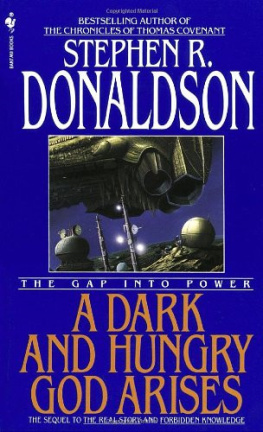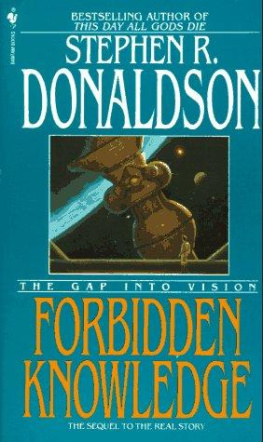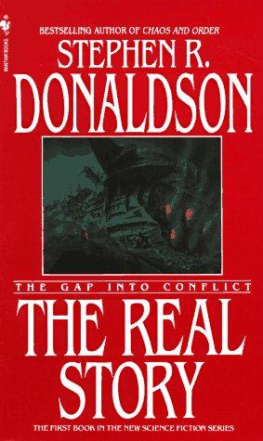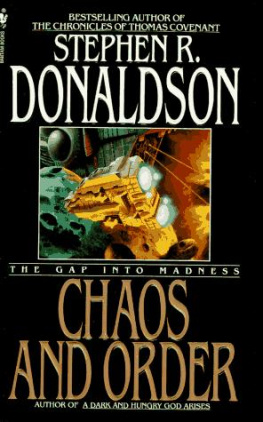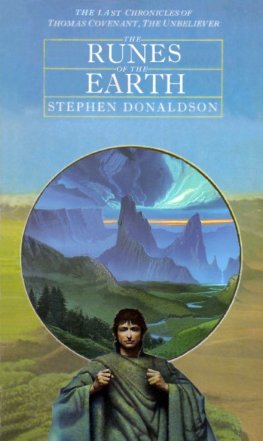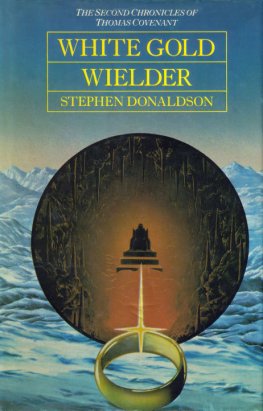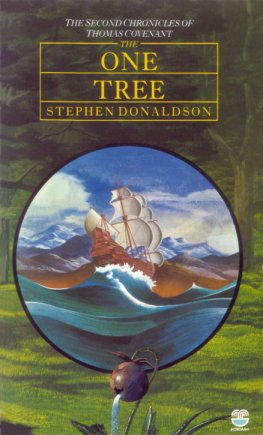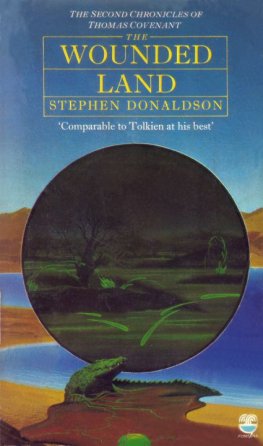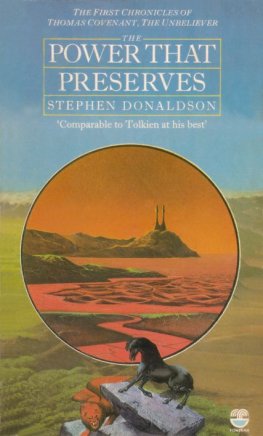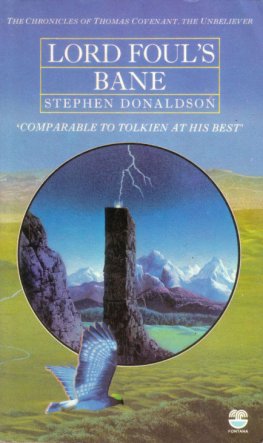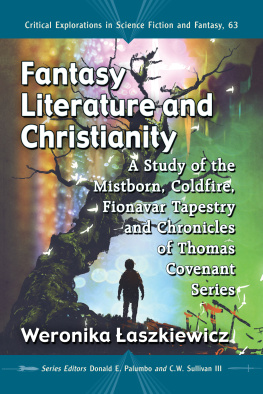1. Lord Fouls Bane
2. The Illearth War
3. The Power That Preserves
1. The Wounded Land
2. The One Tree
3. White Gold Welder
1. The Mirror of Her Dreams
2. A Man Rides Through
1. The Gap into Conflict: The Real Story
2. The Gap into Vision: Forbidden Knowledge
3. The Gap into Power: A Dark and Hungry God Arises
4. The Gap into Madness: Chaos and Order
5. The Gap into Ruin: This Day All Gods Die
Copyright Stephen R. Donaldson 1992
The best team.
HOLT
S hortly before Angus Thermopyle and Milos Taverner left UMCPHQ aboard Trumpet, Holt Fasner visited his mother.
He did this despite the fact that the old harridan had been in a foul temper for decades.
The medical advances which had kept him nearly healthy, relatively strong, almost in his prime, for a hundred fifty years had come too late to be comparably effective for her. In fact, they would have failed her thirty years ago, if he hadnt insisted on plugging her into machines which first pumped blood, then digested food, and eventually breathed for her. She was technically still alive, of course; but now she was only the husk of a woman. Her skin was the blotchy colour of rotting linen; she could hardly move her hands; she hadnt lifted her head from its supports for at least ten years. She no longer knew the difference when tubes brought her sustenance, or carried away waste.
She retained her mind, however. Bitter as a vial of acid, Norna Fasner continued to think long after her body lost its last capacity to do anything.
That was why her son kept her alive. Many years ago shed given up asking him to let her die. She knew from old, painful experience that he would put her off with a bland chuckle and a vacuous remark: You know I cant do without you, Mother. And shortly afterward she would find yet another video screen installed in the room which she considered her tomb.
She studied the screens, even though she hated them. Their images were all she had to think about. If they were switched off, her brain would almost surely go null; and she didnt want that. She desired death, not unconsciousness. If even one of her screens had gone blank, she might have wept in frustration and grief. Every image, every word, every passing implication was a hint which might eventually enable her to believe that her son would be destroyed. Without hints without the possibility that she would receive hints all her years of paralysed, unliving existence would come to nothing.
Her son was the United Mining Companies CEO; unquestionably the richest and beyond doubt the most powerful man alive. From his corporate home office, his station orbiting Earth half a million kilometres beyond UMCPHQ, he ruled his vast empire: the largest, arguably the most necessary enterprise in human history. His employees were counted in millions: men and women who lived or died by his decisions and policies, in billions. Disguised by the UMC charter, and by the public democracy of the Governing Council for Earth and Space which was nominally responsible for controlling men like him, corporations like his he raised and toppled governments, destroyed or enriched competitors, caused potential futures to take on substance or fray away like mist. Behind his back, people who feared him sometimes referred to him as the Dragon and only people who had no idea who he was didnt fear him.
He stood at the nexus of human dealings with for bidden space. All human access to that imponderable source of wealth passed through his hands. And humanitys only defence against that imponderable threat belonged to him.
The value of Holt Fasners time couldnt be measured in pure caesium. Nevertheless he visited his mother when ever an opportunity presented itself. He treasured her advice too much to let her die.
Although he was sometimes hard pressed to interpret it. Her wish for his ruin was so palpable that he had to be extraordinarily careful in how he sifted her insights, what valence he assigned to her pronouncements. As a result, his encounters with her were a challenge which he found profoundly stimulating.
In truth, he could almost certainly have afforded to let her die any time during the past half-century. He liked talking to his mother; he profited from her advice. But he could have done without it. He kept Norna Fasner alive precisely because she wished him ill with such steady virulence; also because he took pleasure in her utter helplessness; and finally because she kept him on his toes. Otherwise he was inclined to forget that he was mortal.
Men who forgot their mortality made mistakes. Holt Fasner had paid blood not always his own for his successes; and now that he had them, he didnt mean to let them go glimmering in the name of a mistake.
So he visited his mother shortly before Trumpets departure. Risks were at work: small risks that might metastasise at any moment. In themselves, Angus Thermopyle, Milos Taverner, Nick Succorso, and Morn Hyland were nothing more than three men and a woman; pawns of Holts larger policies, his grander dreams. But stirred together with Billingate and the Amnion, they might conceivably produce something more volatile, with a lasting impact, like a minor thermonuclear pile which went critical and rendered all its environs uninhabitable for centuries.
The director of the United Mining Companies Police was in charge, of course; Warden Dios himself. The risk was of his choosing, not Holts: the negative consequences, if any, would be his to clean up. But Holt cherished the well-being of the UMCP as he cherished the health of the whole United Mining Companies. If hed believed the risks too great, he would have forbidden them.
He hadnt.
Nor had he dismissed the situation from his mind, however. Instead of trying to second-guess Ward who had spent the better part of three decades proving himself as the Dragons strong right hand Holt went to talk to Norna.
The room where he kept her immured was hidden in the obscure recesses of the home office, in a part of the station where no one ventured except men and women with extremely specialised authorisations. As usual when her several doctors werent examining her, the only illumination in her high sterile sickchamber came from the twenty or so video screens which nearly covered the wall in front of her. That dimness was her choice: the little strength left in her fingers was enough to tap but tons that would raise or lower the lights, adjust her posture, summon assistance or even turn off the screens. Holt allowed her that freedom because he trusted the use she would make of it.

